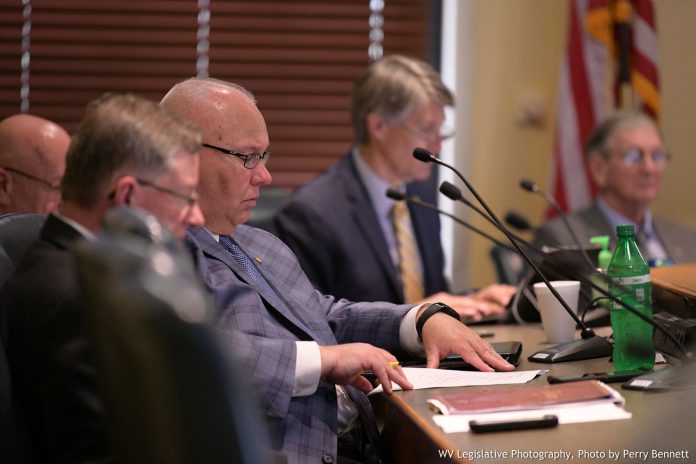The Joint Legislative Committee on Flooding met Tuesday, hearing from the State Auditor’s office and Maj. Gen. James Hoyer.
In the two-hour meeting, lawmakers heard updates on RISE and an audit examining Richwood’s finances.
Steve Connolly, general counsel for the State Auditor’s office, presented findings from the audit. The report started out as an investigation into allegations of purchasing card misuse but it later turned into an 18-month examination of Richwood’s finances.
According to the audit, which was released last month, FEMA allocated $3.1 million to help in recovery efforts from the 2016 floods. However, the audit said, “the city’s recovery has been inhibited by personal greed, incompetence and a complete disregard of fiscal management.”
“Sadly, the City of Richwood now teeters on the brink of bankruptcy, and the primary beneficiaries of the monies appear to be only a few public officials and their family and friends,” the audit stated.
Connolly told the committee a large sum of FEMA funds did not go to its intended purpose. He said the town received $2,574,657 in funds through the public assistance grants program, $36,000 through hazard mitigation, and $512,544 in community disaster loans.
Of the $2.5 million for the public assistance grants, Connolly told the committee about $518,000 was transferred to the general operating funds, at which point it became untraceable. He told the committee more than $900,000 from FEMA funds for specific projects resulted in questionable expenditures or documentation.
The audit outlined several issues, including money requested to repair the city’s main water intake. The city received about $500,000 from FEMA to repair the intake. However, the city made a $400 temporary fix with PVC piping and re-directed FEMA money to pay city officials’ salaries and city debts, according to the audit. The audit stated the water intake has not been repaired and on one occasion, the entire city’s water system was shut down.
Other issues outlined in the audit included:
- Richwood has potential financial liabilities of nearly $3 million and the city does not appear to have financial means to pay off its liabilities
- City Council gave discretion to a recovery team to pay themselves, family, and friends more than $468,000
- The city failed to keep accounting of FEMA funds and diverted money from its intended purpose
- Former Mayor Bob Baber gave his assigned purchasing card to unauthorized users for at least 19 purchases
- Former Police Chief Lloyd Cogar misused his purchasing card, including spending more than $2,000 in tire purchases and services from his personal tire store
Connolly said former city officials were arrested following this audit. According to media reports, Cogar, Baber, former clerk Abigail McClung, and current Richwood Mayor Christine Drennen were arrested earlier this month.
The state Auditor’s office issued seven recommendations following the audit. Recommendations included for the Department of Military Affairs and Public Safety to evaluate how FEMA money is received and to institute better oversight of counties and municipalities that receive FEMA money.
Other recommendations included to establish a guidebook and mandate annual training for counties and municipalities on managing public money after an emergency.
***
Hoyer gave lawmakers a brief update on RISE. He told the committee that as of Tuesday, there are 498 cases, representing an increase of 33 cases from last year.
He said the reason for this increase is because the case management team goes back through and identifies additional individuals eligible.
So far, 50 homes have been completed and 83 are under contract management. He estimated by the end of June, 300 cases would be under the various stages under contract management.
Hoyer also answered questions about West Virginia’s return to HUD’s “slow spender” list for the state’s pace regarding its spending of the total grant award. Hoyer explained slow spender is determined by a three-month average of overall spending compared to the overall grant award.
Hoyer told the committee there were two main factors that contributed to West Virginia being placed back on that list—lengthy environmental processes and significant weather conditions during the winter months.
Hoyer said he is working with West Virginia University’s Law Institute and Marshall University’s environmental center to help expedite and address environmental issues.

